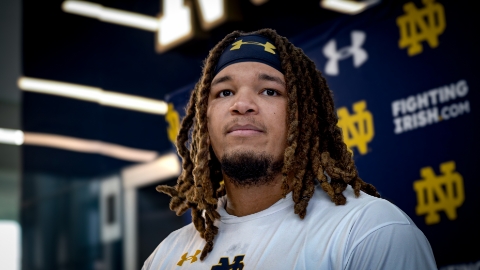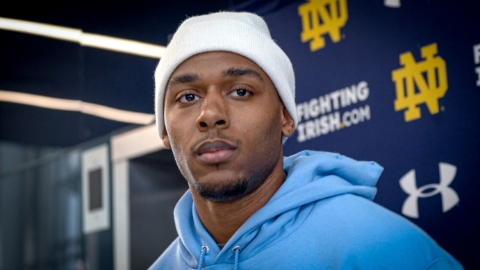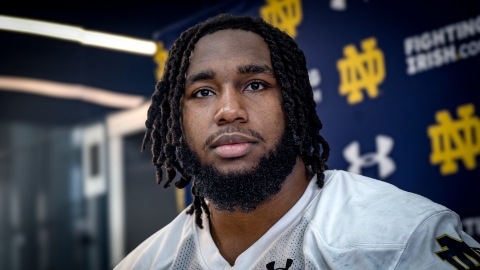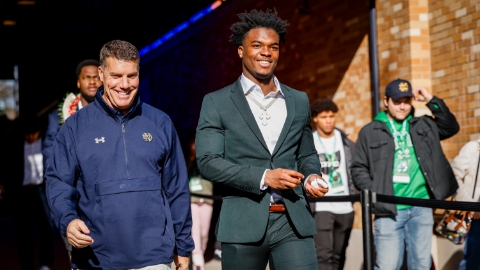
Ignore the sidelines.
Don’t waste time watching for slides.
And if a Notre Dame offensive player runs out of bounds?
Notre Dame players do not, barring two-minute offense situations, run out of bounds.
Chase Claypool cannot even complete the thought.
“Oh, man. Oh no,” Claypool said when asked what happens if someone forgets and ducks out of bounds. “I don’t even want to talk about it.”
The rugged approach, however, is something plenty around the program discuss. It, along with the Irish’s “Road Warrior” mentality, is going to be on national display in primetime Saturday as No. 7 Notre Dame seeks a statement of belonging at No. 3 Georgia.
“It’s very important; that’s what we preach on the offense,” senior wideout Chris Finke said of the Irish’s approach to doling out punishment. “That’s just what football is, if you take it to your opponent, things are going to go well for you.
“And that’s all the way across the board, from the (offensive) line to the running backs to the receivers. Whether it’s with the ball in your hand or blocking for somebody. Just if you can put it in the opponent’s mind that they’re going to get hit, it’s not going to hurt you. It’s going to help you.”
Even quarterback Ian Book, a cheese slice above 6 feet and some 212 pounds, embraces the hit-them-before-they-hit-you approach.
Well, most of the time.
“Coach Long has installed that mindset; you don’t run out of bounds,” said Book, now with 614 rushing yards and six touchdowns on the ground for his career. “We’re seekers of contact, is what he says. And that goes for me, too. In some cases. Some cases.
“Seekers of contact, it’s all about playing the most physical team. The team that takes care of the ball and the team that’s most physical he says is going to win the game. That’s what we’ve been doing since he’s been here and he’s installed that, the receivers know that. You’ve got to be tough.”
The Bulldogs are perhaps the toughest challenge, athletically and physically, the Irish offense could face this season. Georgia ranks third nationally in scoring defense at 7.7 points-per-game allowed, and it ranks fifth in rushing defense with just 182 total yards allowed through three games.
It is a test, Irish coach Brian Kelly says, perhaps unlike any other in his time at Notre Dame.
“I think more than anything else, from our perspective, probably the deepest defense that we have seen,” said Kelly, “in the sense that they can keep bringing players at you.
“We have seen some really great defenses over the last three years, but haven’t had the kind of depth that they have.”
It is a formula, then, on both sides of the ball that mandates Notre Dame bring its most physical brand of football between the hedges.
To lean on the Irish’s brutal summer workouts; the Georgia session pushing blocking sleds the width of the rugby fields in increments, one man after another one.
“It’s something we had drilled in our heads this summer, knowing what our schedule would be like,” Finke said. “We were put in some scenarios and kind of trained our bodies and minds to attack anything that’s put in front of us in a hostile situation.
“So now’s the time to put it on display.”
Adds Claypool, after dragging Louisville defenders in the Irish’s season-opening road win, “Coach Long tells us never to run out of bounds. I had an opportunity to run out of bounds, but I knew it wasn’t really an option. So I love, like, kind of when there’s a lot of guys trying to tackle me and I just don’t go down.
“It gets me fired up, gets the other guys fired up. That’s something that some receivers lack, and I never want to lack that.”
It’s the mindset: Seekers of Contact. The Irish intend to leave their best on the field.
“I think we want to beat them in their place at the maximum level you can want to beat them,” Finke said, “regardless of what happened (in 2017).”



